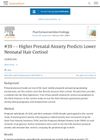 June 2024 in “The American journal of psychiatry”
June 2024 in “The American journal of psychiatry” Schizophrenia risk genes may affect early brain development, contributing to the disease.
99 citations,
January 2004 in “Progress in brain research” Neurotrophins are important for hair growth and could help treat hair loss.
 7 citations,
January 2017 in “Biological & Pharmaceutical Bulletin”
7 citations,
January 2017 in “Biological & Pharmaceutical Bulletin” Certain compounds from Panax ginseng can block proteins that affect hair growth, potentially helping treat hair loss.
 14 citations,
October 2018 in “Brain Research Bulletin”
14 citations,
October 2018 in “Brain Research Bulletin” Exosomes help nerve fibers grow by affecting specific cell signaling pathways.
 1 citations,
February 2022
1 citations,
February 2022 Lavender scent in shampoo can relax and help with memory, while geranium scent can make you more alert and improve memory.
 63 citations,
April 2010 in “Development”
63 citations,
April 2010 in “Development” Compartmentalized organization might be crucial for stem cells to effectively respond to growth or injury.
 February 2024 in “Psychoneuroendocrinology”
February 2024 in “Psychoneuroendocrinology” Higher prenatal anxiety is linked to lower cortisol levels in newborns' hair.
 3 citations,
October 2021 in “Brain Sciences”
3 citations,
October 2021 in “Brain Sciences” Long-term use of Risperidone may be linked to a serious skin condition in bipolar patients, affecting their overall well-being.
 34 citations,
April 2014 in “Psychopharmacology”
34 citations,
April 2014 in “Psychopharmacology” Stress and alcohol affect brain chemicals differently in rats, mice, and humans, influenced by genetic differences.
22 citations,
September 2008 in “Brain & development” Biotin supplements increased biotin levels but did not significantly prevent hair loss in rats on valproic acid.
15 citations,
May 2006 in “Brain & development” Valproic acid may cause hair loss by reducing biotinidase enzyme activity in rats.
 30 citations,
October 2016 in “Current research in translational medicine”
30 citations,
October 2016 in “Current research in translational medicine” Hair follicles on the scalp interact with and respond to the nervous system, influencing their own behavior and growth.
 October 2024 in “World Journal of Psychiatry”
October 2024 in “World Journal of Psychiatry” Stress worsens hair loss in androgenetic alopecia.
 November 2019 in “Synapse”
November 2019 in “Synapse” Brain-made chemicals can control nerve cell function differently in various parts of a mouse's brain, which may help us understand neurological conditions.
 12 citations,
June 2020 in “Frontiers in Cell and Developmental Biology”
12 citations,
June 2020 in “Frontiers in Cell and Developmental Biology” The PP2A-B55α protein is essential for brain and skin development in embryos.
 2 citations,
September 2015 in “Journal of the Egyptian Women's Dermatologic Society (Print)”
2 citations,
September 2015 in “Journal of the Egyptian Women's Dermatologic Society (Print)” People with psoriasis and depression have lower BDNF levels, which could help measure depression in those with psoriasis.
 November 2021 in “CRC Press eBooks”
November 2021 in “CRC Press eBooks” Anagen effluvium is a reversible condition causing sudden hair loss, often due to chemotherapy or head radiation.
3 citations,
July 2022 in “Brain and Behavior” The HtrA1L364P mutation causes brain dysfunction and blood vessel damage.
 21 citations,
May 2008 in “Talanta”
21 citations,
May 2008 in “Talanta” New, cheaper method measures finasteride in tablets accurately and quickly.
 2 citations,
November 2013 in “Elsevier eBooks”
2 citations,
November 2013 in “Elsevier eBooks” Hormones control reproduction and are crucial for body balance.
 1 citations,
September 2017 in “Frontiers in Laboratory Medicine”
1 citations,
September 2017 in “Frontiers in Laboratory Medicine” Gut flora changes could potentially indicate depression, but more research is needed.
 26 citations,
November 1993 in “Progress in Neuro-psychopharmacology & Biological Psychiatry”
26 citations,
November 1993 in “Progress in Neuro-psychopharmacology & Biological Psychiatry” Treatment during development affects hormone balance and sexual behavior in male rats.
 131 citations,
October 2004 in “Clinical Cancer Research”
131 citations,
October 2004 in “Clinical Cancer Research” Tempol is safe and may prevent hair loss from brain radiotherapy.
January 2020 in “International Research Journal of Ayurveda & Yoga” Stress may contribute to the development of hypothyroidism, and both modern and Ayurvedic treatments can manage the condition.
1 citations,
February 2022 in “Research journal of pharmacy and technology” Wrightia tinctoria extract may promote hair growth better than minoxidil.
7 citations,
May 2017 in “Behavioural brain research” Changing neuroactive steroid levels early in life can affect how adult rats respond to alcohol's stimulating effects.
 31 citations,
September 2012 in “Human Brain Mapping”
31 citations,
September 2012 in “Human Brain Mapping” People with Seasonal Affective Disorder have different brain activity in certain areas when resting.
 January 2017 in “International journal of science and research”
January 2017 in “International journal of science and research” Trichotillomania is a chronic hair-pulling disorder, more common in females, treated with therapy and sometimes medication.
 3 citations,
September 2020 in “Molecular Brain”
3 citations,
September 2020 in “Molecular Brain” The anti-viral drug Elvitegravir may protect brain cells from damage related to neurodegenerative diseases.
 2 citations,
July 2020 in “Behavioural Brain Research”
2 citations,
July 2020 in “Behavioural Brain Research” Changing neuroactive steroids in baby male rats affects their memory and learning differently as they grow up.























